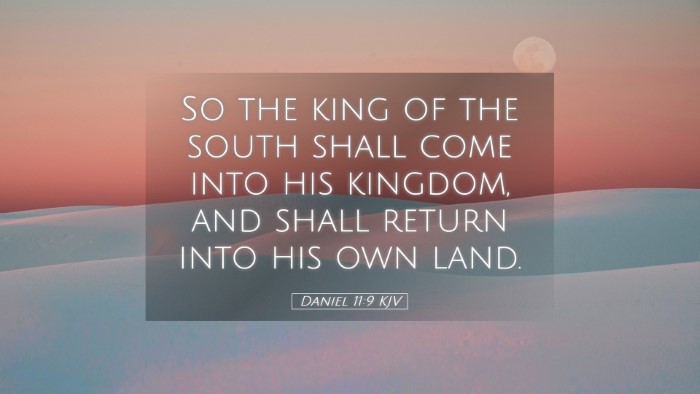Commentary on Daniel 11:9
Text of Daniel 11:9 (KJV): "And out of one of them came forth a little horn, which waxed exceeding great, toward the south, and toward the east, and toward the pleasant land."
Introduction
The prophecy of Daniel contains significant historical and prophetic elements, particularly in chapters 10 through 12, which outline the conflicts and key figures of the Hellenistic and Roman periods. Daniel 11:9 specifically introduces a powerful figure emanating from the historical context of the Seleucid and Ptolemaic empires. The insights from public domain commentaries will explore the implications of this verse, providing depth for pastors, theologians, and scholars.
Contextual Analysis
To better understand Daniel 11:9, we must consider its wider context:
- The prophecy is primarily concerned with the struggle for power between the Ptolemies of Egypt and the Seleucids of Syria.
- This verse continues from previous sections that detail the rise of kings and the interactions between these two dynasties.
- Each figure mentioned in this prophetic narrative symbolizes larger historical realities and divine purposes.
Commentary Insights
Matthew Henry's Commentary
Matthew Henry emphasizes the significance of the "little horn" mentioned in this verse, suggesting that this represents a ruler that appears to arise from one of the divisions among the Greek kingdoms that succeeded Alexander the Great. He posits that this figure will be notable for an aggressive expansionist policy, signifying a great power that is characterized by its ambition to dominate the regions south, east, and towards the "pleasant land," often interpreted to signify Judea.
Albert Barnes' Commentary
Albert Barnes draws attention to the implications of the "little horn" in the context of historical events. He suggests that this term metaphorically represents Antiochus Epiphanes, a Seleucid king notorious for his persecution of the Jewish people and his desecration of the Temple. Barnes delineates how this king's actions fulfill the prophetic utterances regarding the conflicts that involve Egypt and the surrounding nations, rendering this verse as a keystone in understanding the larger framework of the Maccabean revolt and the eventual establishment of a more enduring Jewish identity.
Adam Clarke's Commentary
Adam Clarke provides an extensive historical backdrop, interpreting the "little horn" as indicative of ephemeral power that seeks to establish itself amidst turmoil. Clarke notes that the territorial ambitions described—moving south and east—highlight both military might and prophetic fulfillment. He further connects this power to the aspects of divine judgment, where despite the seeming success of such rulers, their end reveals the overarching sovereignty of God. Clarke encourages readers to reflect on the sovereignty of God, particularly amidst human strife.
Theological Implications
This verse carries substantive theological undercurrents, especially concerning the sovereignty of God over earthly kingdoms.
- Divine Sovereignty: The existence and rise of such powers remind believers that God orchestrates history for His purposes, even using seemingly negative events for ultimate good.
- Hope amidst Persecution: Daniel 11:9 serves as a reminder to those suffering oppression that their struggles are seen by God, and historical patterns indicate a promise of eventual deliverance.
- The Nature of Human Ambition: The drive for power depicted in this verse reflects the deeper understanding of human nature—our inclination towards dominance and control, contrasted with God’s plan for humility and service.
Practical Applications
For pastors and theologians, Daniel 11:9 serves as both a cautionary tale and an encouragement:
- Engaging with History: Understanding the historical context enhances preaching and teaching, enabling congregations to connect biblical truths with contemporary issues.
- Encouraging Hope: This verse is a reminder of the eventual triumph of God's people, encouraging believers to hold fast to their faith amidst trials.
- Promoting Humility: The ambition of worldly leaders stands in stark contrast to the Christian call to serve others sacrificially—this is an opportunity for sermons on servanthood.
Conclusion
In summary, Daniel 11:9 captures a moment of profound significance in the biblical narrative—a convergence of historical and prophetic meaning that remains relevant for understanding God's sovereignty. The insights drawn from the writings of Matthew Henry, Albert Barnes, and Adam Clarke present a valuable resource, encouraging deeper reflection on the nature of power, the reality of suffering, and the hopeful assurance of God's ultimate plan. As scholars, pastors, and students of Scripture, let us be diligent in our study, allowing the truths revealed in this verse to inform our faith and practice.


